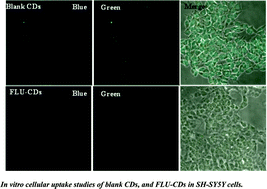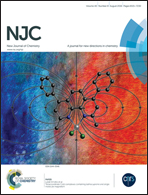Abstract
In this work, fluorescent carbon dots were prepared using vancomycin as a precursor via hydrothermal treatment. The synthesized fluorescent CDs are well dispersed in water and exhibited a quantum yield of 6.47%. The functionalization of an anticancer drug flutamide on the surfaces of CDs endowed them with the ability to act as good candidates for capturing and releasing the flutamide drug in an acidic microenvironment (pH 5.2). The flutamide-loaded CDs were found to be biocompatible towards MCF-7 (human breast cancer) and SH-SY5Y (human neuroblastoma) cells with the survival rate of 75%. The carbon dots and flutamide-loaded carbon dots were used as fluorescent probes for the imaging of cells and showed good target specific action. The carbon dots showed negligible toxicity to MCF-7 cells. The application of flutamide-coated carbon dots for anticancer drug delivery has also been demonstrated. Therefore, we have evaluated flutamide-loaded carbon dot hybrids as prospective candidates to achieve simultaneous imaging and drug delivery in cancer cells.


 Please wait while we load your content...
Please wait while we load your content...